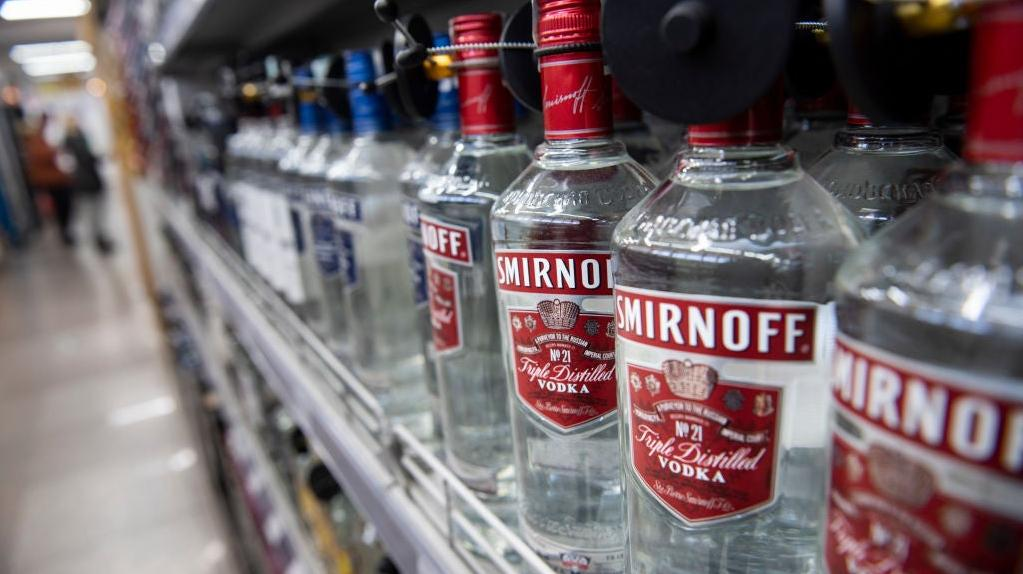Stop Boycotting 'Russian' Things That Aren't Russian
Though your intentions might be good, they could be aiming the wrong way.
The war in Ukraine is an atrocity, there's no doubt about it. During this awful time, people across the world have banded together to boycott Russian-made goods, trying their best to cut off any cash flow to the country. Their hopes are to cut down on any funding that might be funneled to its military efforts against Ukraine. But some of those efforts, as well-meaning as they are, happen to be hurting Russian-sounding brands that aren't actually Russian along the way.
For example, Smirnoff vodka is taking a hit right now, reports The Sun. Though its name is certainly Russian, originally distilled by Pyotr Arsenievich Smirnov in Moscow, Smirnoff is owned by a British drink company, Diageo. Diageo owns other major brands like Jose Cuervo, Guinness, Captain Morgan's, and more. Stolichnaya vodka, aka good ol' Stoli, is a formerly Russian product that's now produced in Latvia. And if you were worried about Belvedere for some reason, don't worry, that vodka is produced in Poland.
How the restaurant industry is boycotting Russia
There are multiple restaurants boycotting Russian brands at the moment. Evel Pie in Las Vegas, a pizzeria, has even gone so far as to declare it would destroy its entire inventory of Russian-made vodkas and replace them with Ukrainian ones, reports KSBY. The Siren, a restaurant in California's Morro Bay area, is also pulling Russian products off its shelves as well.
Owner of The Siren, Paul Boisclair, admits, "It doesn't mean a hill of beans to Russia. However, we're not going to reward anyone associated with that regime for the killing of innocents in Ukraine and we encourage others to wake up to that fact as well."
But Mlive reports that owner of Bob's Bar in Grand Rapids, Michigan, Bob Quay, has decided to pull both the aforementioned Smirnoff and Stolichnaya vodkas off his shelves, which, though well-meaning, isn't hurting a Russian brand as intended...since they aren't actually Russian.
The impact on Russian (and not Russian) restaurants
CBS News has also learned that some New York-based Russian restaurants have lost as much as 60% in business since the Ukrainian invasion began. But despite the fact that these restaurants support the Ukrainian cause, that's not stopping people from making profanity-laced calls and refusing to give the restaurants their business. So some Russian-Americans are having to field some of the fallout from the war, even though they vehemently disagree with what's happening overseas.
Businesses in other countries are also being negatively impacted. Russian Spoon Bakery in Vancouver, has been receiving threatening phone calls due to its name, reports Narcity. The bakery owner, Natalia Mitrofanova, says she's even been getting expletive-laden calls in Ukrainian (the bakery also serves Ukrainian food), and is concerned that the situation might escalate further than just phone calls.
Business Insider reports that French restaurant La Maison de la Poutine says that it's been getting threats from people who think its namesake Canadian dish, poutine, is named after Vladimir Putin. I don't even know where to begin with this one. Just to be absolutely clear, poutine has nothing to do with Putin; it's a classic Quebecois dish composed of fries drenched in gravy and topped with cheese curds. I realize the name and the word sound fairly similar, but that one is a head scratcher.
How to support Ukraine
If you want to support the Ukrainian cause, there are other ways to do it than simply by boycotting, like by donating to the World Central Kitchen, who is feeding Ukrainian refugees. Why not go to your locally owned Ukrainian restaurant, too? And refusing to patronize Russian-American owned businesses is going to hurt the wrong people. You have to remember, many Russian immigrants came to America to avoid situations like the one that's occurring now.
So before you declare a boycott on all things Russian, try to support other people first. It's likely that spending a dollar rather than withholding it will go much, much, further in the long run.
